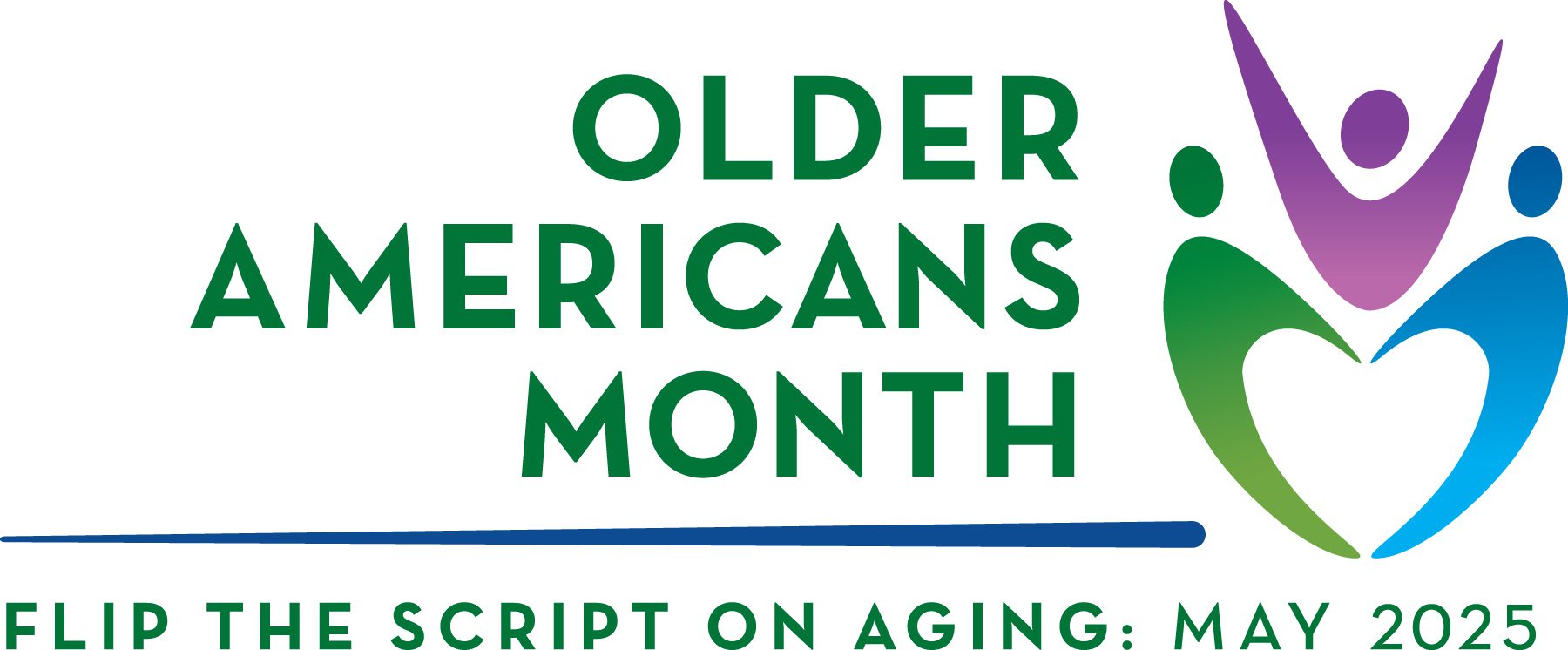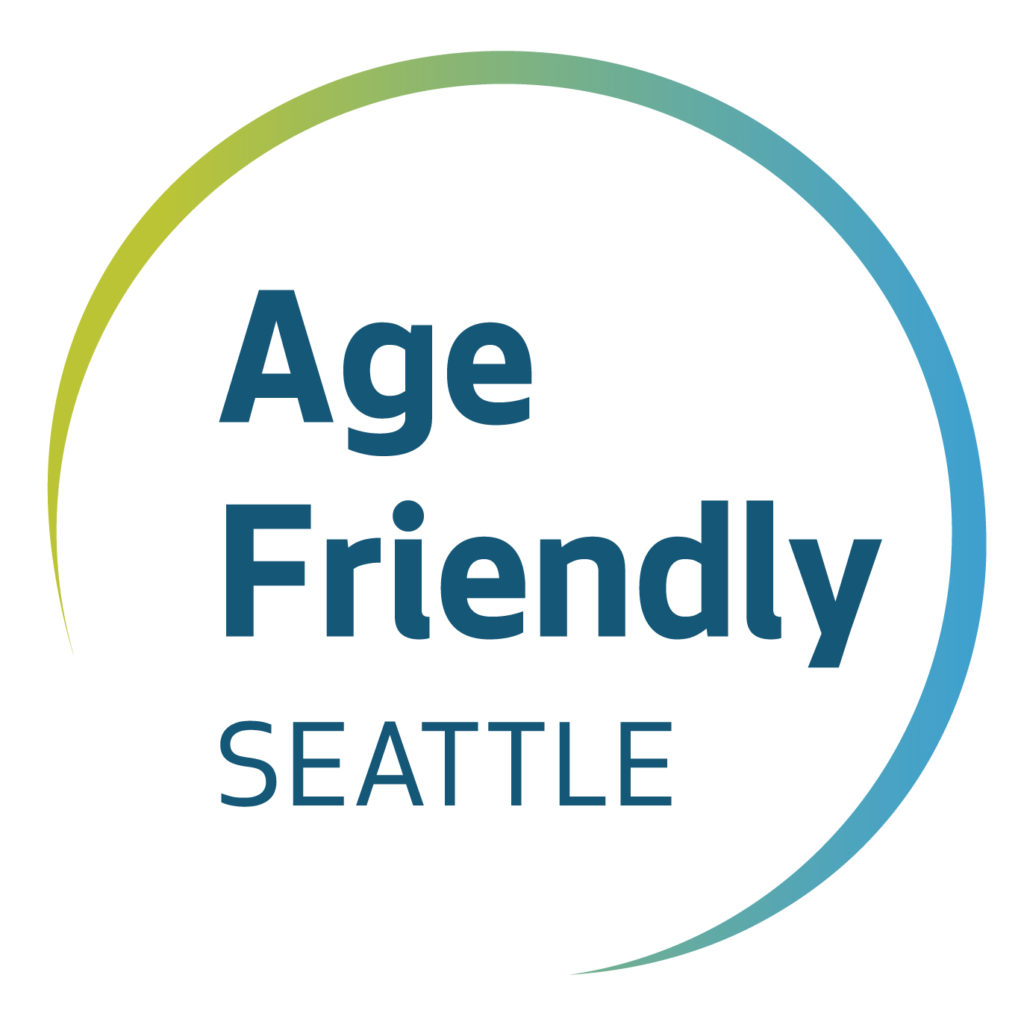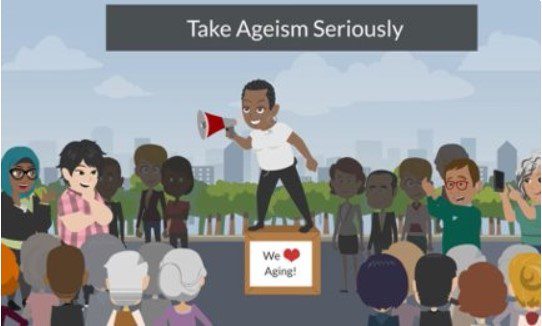Every May, Older Americans Month (OAM), brings an opportunity to recognize the contributions of older Americans, discuss aging trends, and reassert a commitment to serving older adults in the community. The theme for 2025, “Flip the Script on Aging,” focuses on changing how society perceives, discusses, and addresses aging.
The World Health Organization (WHO) defines Ageism as the stereotypes (how we think), prejudices (how we feel), and discrimination (how we act) toward others or ourselves based on age. In Seattle, Age Friendly Seattle is flipping the script on aging and combating ageism through its innovative ‘We❤Aging: Anti-Ageism Training’. The online course utilizes short videos, real-life stories, and personal reflections to provide background information and context for understanding aging and ageism.
While the course is completed individually, facilitated follow-up discussions by Age Friendly Seattle staff and volunteer ambassadors—both online and in-person—enhance the experience by fostering deeper reflection and connection to personal and professional lives, turning awareness into action.
Program Origins
The idea for the training has been in development for years. “Even back in 2016 and 2017, when the Age Friendly Seattle initiative was just getting started, community discussions centered around what it really means to be age-friendly,” said Meg Woolf, Program Coordinator for Age Friendly Seattle, who led the development of the trainings. “Increasing awareness was essential. Ageism is one of the most misunderstood ‘isms,’ and it often occurs beneath the surface—without people even realizing it.”
A team of subject matter experts collaborated to create the training content, focusing on how ageism influences personal biases, systemic practices, and cultural norms while also addressing ageism from both a professional and personal perspective. “We approached it from a broader perspective—examining how our mindsets are shaped by ageist beliefs and identifying practical steps people can take to combat these biases,” Meg explained. Over time, this vision took shape and was officially launched internally as training for City of Seattle employees in 2023. By May 2024, a public version of the training became available to community members and organizations.
Anti-Ageism Ambassadors
Ambassadors are at the heart of the program’s success. Barb Williams and Alex O’Reilly joined as ambassadors after participating in a training session with the Seattle-King County Advisory Council on Aging and Disability Services. Since then, they have played a crucial role in facilitating meaningful post-training discussions.
Alex was inspired to become an ambassador because she believed the training’s message should reach a wider audience. “All of the effort put into developing this training needs to be shared with others,” she said, “and hopefully, it will make a difference—even if those changes are small.” She noted that the training has already impacted the Advisory Council itself by changing how members discuss the needs of older adults in their advocacy work.
Barb emphasized the importance of raising awareness of and being receptive to the lived experiences of older adults. “People should pause before they react,” she suggested. “This person, perhaps an older individual, might have valuable insights that I wouldn’t have considered because I am younger. This person has lived through many situations and conflicts, both internationally and locally. We should listen to each other more than we do.”
Through these important reflective discussions, Barb and Alex are working to make Seattle a more age-inclusive city where everyone’s voice is valued, regardless of their age. Their efforts not only support participants but also inspire the Age Friendly Seattle team. “Seeing the ambassadors in action and witnessing the impact of their contributions has been truly inspiring for me,” Meg shared. “We hope to continue building on that moving forward.” Their work is expanding the program’s reach and impact, helping to change mindsets and spark positive change throughout the city.
Impact and Success Stories
While the training provides a broader understanding of how ageism operates, some of its most profound effects are deeply personal. Meg recalled a participant’s reflection that particularly stood out: “During dinners with his grandchildren, he shared that he often remained quiet because he didn’t understand everything they were discussing,” she said. “He felt as though his time had passed and that he had nothing to contribute.” However, after completing the training, that same participant expressed his intention to speak up more at family gatherings and share his life experiences. “That moment really resonated with me,” Meg added. “It demonstrated that this isn’t just about social change, it’s also about helping people reclaim their voices.”
The training prompts individuals to question their beliefs, fostering reconnections with their communities, families, and themselves. These key moments highlight the essence of flipping the script on aging.
Looking Ahead
As Age Friendly Seattle continues to expand its reach, the biggest challenge remains a fundamental one, capturing people’s attention and engaging more with the community. Work is happening now to create a training that addresses Ageism in Healthcare. Ageism is often overlooked and can be embedded in our daily interactions, making the effort to raise awareness and change people of all age’s perception on aging ever so important.
This is why the role of ambassadors like Barb and Alex is so crucial. As the program grows, Age Friendly Seattle is also looking for more ambassadors to help lead post-training debriefing discussions.
If you are interested in becoming an ambassador or if your organization is interested in hosting an anti-ageism training discussion facilitated by Age Friendly staff and ambassadors, please reach out to Meg Woolf at Meg.Woolf@seattle.gov. Help us change we way we all think about aging and growing older!


